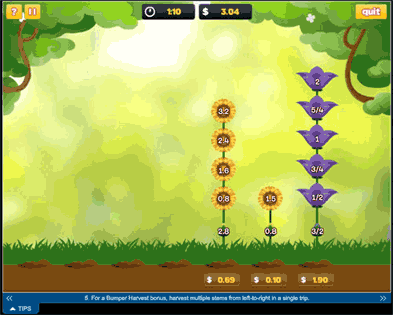Mangahigh
Description
Mangahigh.com is one of the world's first games-based-learning sites, where students learn Mathematics via purpose-built casual games that balance fun and learning.
Mangahigh is proven to be effective for the following reasons:
- Adaptivity: Each game covers certain learning topics and is designed to dynamically adapt in difficulty to the ability of the student in order to aid the student to stay in their zone of proximal development i.e. "the level of difficulty that is neither too hard nor too easy, and is the level at which optimal learning takes place"(Renaissance Learning, 2007).
- Automaticity: "is the ability to do things without occupying the mind with the low level details required. It is usually the result of learning, repetition, and practice" (Wikipedia). All Mangahigh games have a meta-objective that the players strive to achieve by repeating a simple step (game mechanic) over and over again. By overlaying the game mechanic with the core learning concept, we've invented the new and more efficient way of learning for the new generation.
- Discipline and self-learning: Games develop students' ability and curiosity to observe, hypothesize, test, evaluate, conclude and refine ideas that are not always possible with traditional pedagogic teaching.
- Application of theory: The games provide powerful contexts that often bring out the 'real-world' application of the topic at hand, thereby increasing the students' interest in the content and encouraging them to explore further.
Pricing
| Plan | Price | Details |
|---|---|---|
| Mangahigh | Free | Free for teachers. |
Reviews
Mangahigh is a good place to learn mathematics, especially for kids. We all know that most kids don't like studying, especially hard mathematics. But when games are introduced into learning, it makes it seem more enjoyable for kids. The best feature about this site is the adaptability of questions. If the question is too hard, it reverts to an easier one. The logic is sound, because when kids feel that the questions are too hard or impossible, they would feel frustrated and stop using this site; therefore hinders learning. I don't only recommend this site to kids, but also for adults who love mathematics and games like me.
My students (and by extension, I) love this website. Fun games and competitions with schools from around the world really motivate my kids to get online and practice. I can set challenges for the kids so that they are working on skills that we are currently reviewing, or general year-long needs.
The site is designed for about grades 2-12, but it seems like it was designed 12-2, if you get my drift. The bulk of the standards addressed are geared towards middle and high school, but there is still quite a bit left for my little fourth graders. However, this means that if my kids just go to play games they are interested in (as opposed to what I have assigned) they are highly likely to be in over their heads and start guessing.
The site is divided between challenges and games. The games are great practice for certain skills, and the kids obviously prefer those, but I love the challenges. The challenges support several elements of gamification into the practice. First, questions only get harder if the player is successful. If questions are too hard, they get bumped down to easier questions. Although they are definitely aware of what level of questions they are on, this doesn't usually discourage them. They try like mad to get up to a higher level, and it is really motivating.
There is also a badge system where they are awarded for getting a certain score on the activity. Other than being proud about your own badges, you can compare your progress with that of your classmates. My kids not only strive to be number 1, but they congratulate those kids who are beating them.
Recently my class was invited to participate in our first Fai-To (Manga High's competition system). We competed with a school from England, and even though it was clear that our competitors weren't really using Manga High at the time (I think that had one badge earned throughout the whole week) my kids were dying to get on there and practice both during math time at school and during the evening at home. The Fai-To basically compares how many badges were earned by each school, each day, and decides the winner. It also names one 'Round Hero' who is the person from the winning school who earned the most badges each round. I will never forget how, at the end of the first round, I announced who the 'hero' was, and the class spontaneously erupted in applause and cheers for him.
In short, you can tell my whole class loves this site.





A anime style site for learning Math grades K-12.